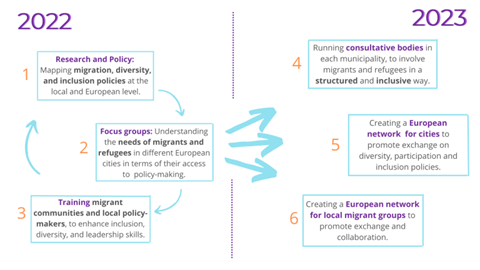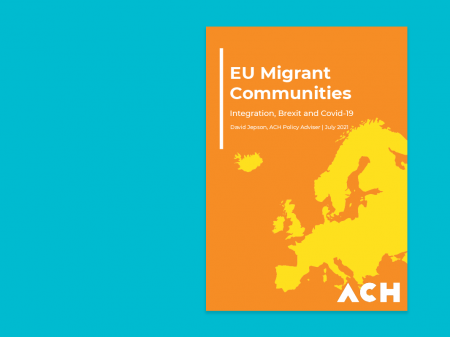
Building lasting connections across Europe | The MILE project
“We are delighted to be a part of MILE and to bring our 14+ years of experience in providing tailored integration services for refugees and migrants to co-create policies that represent the diverse population and connect local governments and migrant groups not just in the UK, but across Europe” Fuad Mahamed, ACH’s CEO
ACH is proud to be a partner on the MILE project, a two-year project that aims to empower migrants and refugees and help to build lasting connections between migrant groups and local governments in Europe. Read all about this exciting project below and, download ‘MILE in a nutshell’ here.
MILE stands for Migrant Integration through Locally designed Experiences and is about empowering the local community as a whole, including migrant communities. Co-funded through the European Union’s Asylum, Migration and Integration Fund, MILE aims to create positive change across Europe with partners in six European countries: Belgium, Greece, Latvia, Spain, the Netherlands, and the UK. ACH's partners the Centre for Research in Ethnic Minority Entrepreneurship (CREME) at Aston University and Birmingham City Council represent local partners on the project.
The project stemmed from the idea that policy-making – especially at the local level – should be a co-created process that reflects the diverse population of cities and includes the voices of people from migrant backgrounds. By involving municipalities, migrant groups, and research teams across Europe, MILE aims to empower migrants and refugees and help to build lasting connections between migrant groups and local governments in Europe. A vision that is very much in line with ours at ACH - to empower refugees and migrants who reside in the UK to lead self-sufficient and ambitious lives.
MILE’s goals
- Achieve a better understanding of the needs of municipalities and migrant and refugee communities in their local context;
- Facilitate the political participation and leadership of migrants and refugees;
- Promote the management of inclusive policy-making in municipalities;
- Turn concrete and unique migration experiences into recommendations for better inclusion and participation policies at the local and European level;
- Set up consultative bodies in each partnering municipality for migrants and refugees to be part of local policy- and decision-making in a structured way
- Set up a Europe-wide network for municipalities to exchange and collaborate on migration, inclusion, diversity, and participation issues;
- Set up a peer-to-peer exchange platform for migrant-led organisations that will constitute the backbone of future collaborations.

MILE will produce research-based and locally-tailored responses that can address the current needs and priorities of municipalities and migrant communities. The participation tools developed by partnering research teams, municipalities, and migrant-led organisations aim to serve as a springboard for deeper social, economic, and political inclusion and long-term.
Participation Tools
Policy analysis and responses
MILE will produce analysis of local and European inclusion policies based on existing frameworks, such as the Integrating Cities toolkit, to guide its activities. For this, we are using benchmarks indicating levels of inclusivity and accessibility in local and European policy-making processes. The choice of common benchmarks and time frames will allow us to draw lines between the different municipalities and their inclusion policies while showcasing their unique realities, challenges, and solutions. Based on background research for each municipality and at the EU level, MILE will produce tailored responses and tools for the inclusion and participation of migrants in policy-making.
Training
The training, designed by New Women Connectors, will be delivered in 2022 to migrant-led organisations and municipality staff. Based on both the needs of local migrant communities and municipalities, the aim is to increase the presence of migrants and refugee representatives in the policy-making process in the municipalities involved in the project and to train both to enhance their capacity for collaboration. The training for the migrant communities with focus on developing their advocacy and leadership skills while municipality staff will be trained in diversity management.
Local migrant consultative bodies
MILE will lead to the creation of consultative bodies in four municipalities – Birmingham, Ioannina, Riga, and Ripollet – relying on the experience of the cities of Amsterdam and Utrecht. These consultative bodies will include representatives of migrant communities in the respective city. By providing a space for regular and structured democratic encounters, the aim to encourage and facilitate the consultation of migrants for decisions and policies in different priority areas.
Long-term city and migrant networks
Building on the consultative bodies, MILE will set up two Europe-wide networks – one for municipalities and one for migrant-led organisations. These networks will be the backbone for future collaboration and exchange around migration, inclusion, and participation. Open to all interested municipalities and migrant-led organisations the networks will provide an opportunity for its members to exchange experiences with each other on challenges and best practices, thus empowering each other and building stronger links.
Communication
Our communication activities will include online and offline campaigns as well as events, addressing all those interested in promoting inclusive migration and integration policies as well as participation at the local level and across Europe. Our aim is to communicate in an inclusive and intersectional manner about MILE’s activities and the issues we aim to address: migration, diversity, participation, and inclusive policy-making.
Voices on inclusion and participation
An insight on what inclusion and participation means to people from migrant and refugee communities, municipalities and research teams.
As part of the project, MILE recently deep-dived into...
- What makes a city inclusive?
- How do municipalities benefit from diversity and participation in policy-making?
- What are some of migrants' and refugees' priorities when it comes to being part of decisions in their local community?
Read the responses here!
ACH’s is excited to be a part of MILE, empowering migrants and refugees and helping to build lasting connections between migrant groups and local governments across Europe. Keep your eyes peeled for further updates on this great initiative. To find out more about MILE or contact the team, please visit the MILE website.

The information, documentation and figures in this website are prepared by the MILE project consortium, a project co-funded under the European Union’s Asylum, Migration and Integration Fund (AMIF-2020-AG-CALL-03), and do not necessarily reflect the views of the European Commission. The European Commission is not liable for any use that may be made of the information contained herein.

